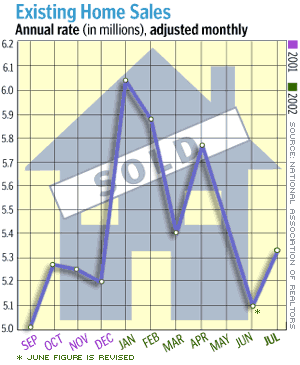NEW YORK (CNN/Money) -
Sales of existing homes in the United States rose in July, a realty group said Monday, while a separate government report showed new home sales rose to a record pace, pointing to relentless strength in the housing market, which has helped keep the broader economy from sinking too deep.
The National Association of Realtors said existing home sales rose 4.5 percent to a 5.33 million-unit annual pace, compared with June's revised 5.1 million-unit rate.
Separately, the Commerce Department said sales of new homes rose 6.7 percent to a record 1.017-million-unit pace from June's revised 953,000-unit rate.

Economists, on average, expected new home sales to fall to a 975,000-unit pace and existing home sales to rise to a 5.3-million-unit pace, according to Briefing.com.
"With the surprise jump in new home sales and the outsized rise in existing home sales, we now see that widespread talk of the demise of our moderate economic recovery has been somewhat exaggerated," said Anthony Chan, chief economist at Banc One Investment Advisors.
Still, the data seemed to have little impact on U.S. stock prices, which fell in midday trading. Treasury bond prices rose.
The jump in existing home sales followed a drop in June, though that drop was only a temporary breather from the blistering pace of sales in the first months of the year.
"Home sales in June dipped more than expected following record activity at the beginning the year, which was spurred by exceptionally mild weather," NAR President Martin Edwards said. "Home sales should hold to a slower but more even course in the second half of the year."
| |
 Related stories
Related stories
| |
| | |
| | |
|
The median existing-home price was $162,800 in July, up 7.3 percent from a year ago. The median new-home price was $170,500, down 2.6 percent from a year ago, but the average new home price has risen 2.8 percent to $215,200.
Persistently low mortgage rates have helped keep demand for houses -- and home prices -- high. Higher home values have made homeowners feel richer, encouraging them to spend and boost the broader economy.
Low rates also have fueled a boom in refinancing, putting more money in consumers' pockets and encouraging consumer spending, which fuels two-thirds of all U.S. economic activity.
Some economists have been concerned that weakness in the stock market this summer could weigh on consumer spending, pushing the economy back into a recession; continuing strength in the housing market could help consumers weather the market downturn.

|

